Subjective Interactive Learning Skills and Communication: Coursework
VerifiedAdded on 2021/04/21
|11
|2615
|517
Homework Assignment
AI Summary
This assignment delves into the multifaceted aspects of interactive learning skills and communication, providing a comprehensive overview of essential strategies for academic success. It begins by exploring the resources available at the University of Portsmouth, including laboratories, library and e-learning facilities, and various support services. The assignment then focuses on time management, emphasizing the importance of planning and utilizing notional study hours effectively, along with techniques to combat procrastination. Furthermore, it covers the concept of continuous improvement and objectivity in relation to academic performance, highlighting the significance of self-evaluation and accountability. The assignment also explores personal creativity, discussing techniques like brainstorming and mind mapping, and provides insights into effective examination techniques and skills. Additionally, it examines the dynamics of teamwork, emphasizing the qualities of effective team members and the benefits of collaborative efforts. Finally, the assignment addresses individual productivity, outlining essential skills such as identifying priorities, maintaining a positive attitude, and utilizing soft skills to enhance overall performance.
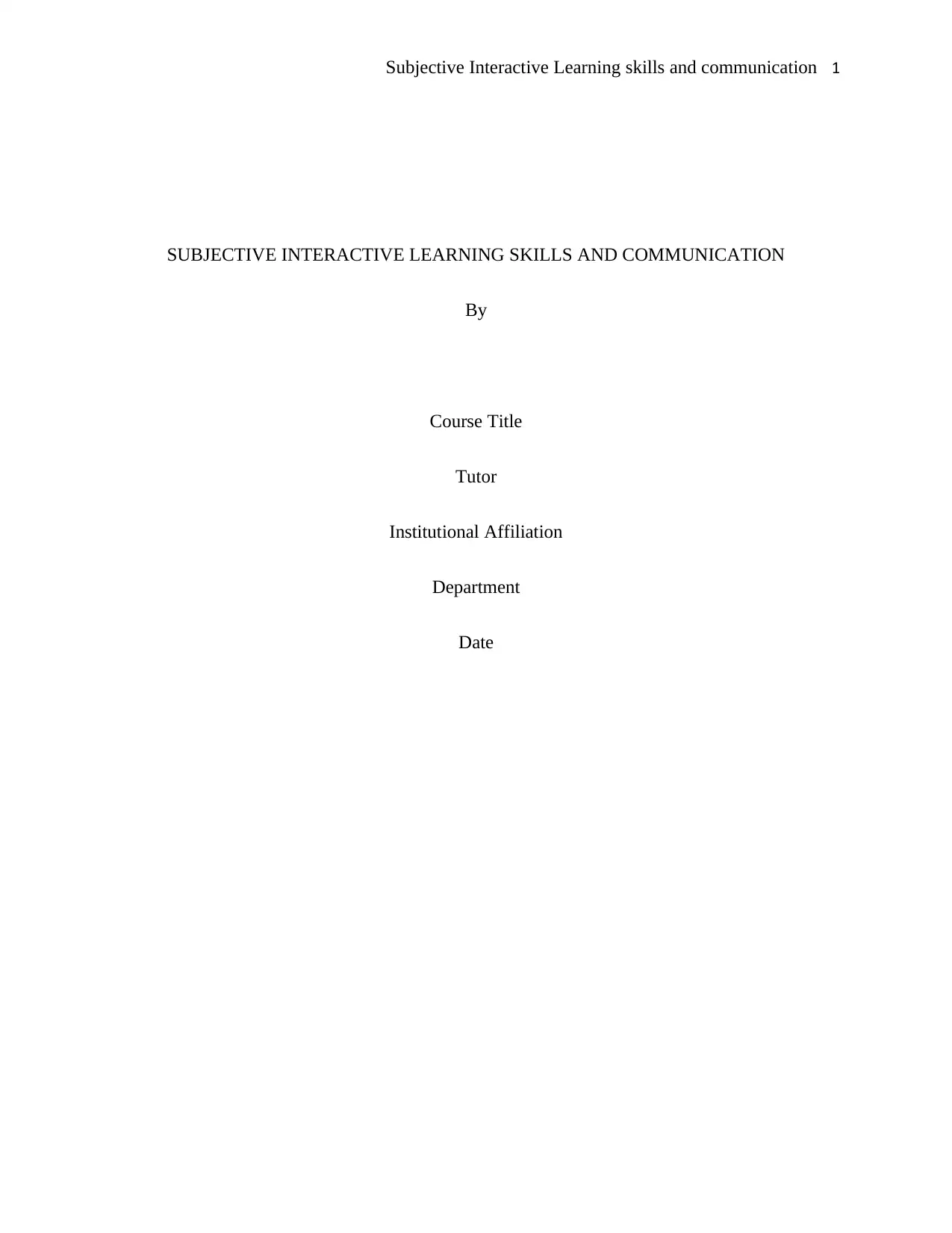
Subjective Interactive Learning skills and communication 1
SUBJECTIVE INTERACTIVE LEARNING SKILLS AND COMMUNICATION
By
Course Title
Tutor
Institutional Affiliation
Department
Date
SUBJECTIVE INTERACTIVE LEARNING SKILLS AND COMMUNICATION
By
Course Title
Tutor
Institutional Affiliation
Department
Date
Paraphrase This Document
Need a fresh take? Get an instant paraphrase of this document with our AI Paraphraser
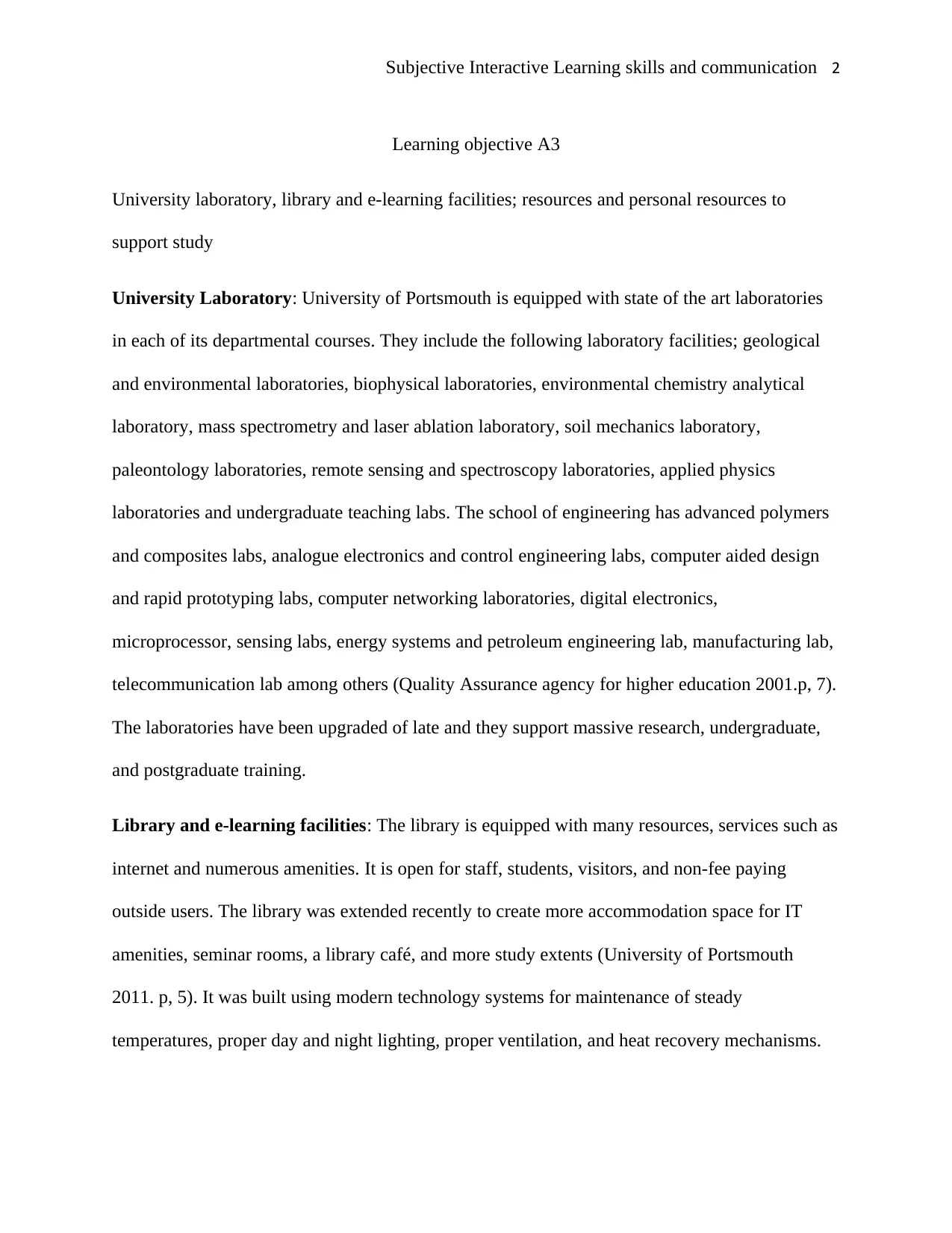
Subjective Interactive Learning skills and communication 2
Learning objective A3
University laboratory, library and e-learning facilities; resources and personal resources to
support study
University Laboratory: University of Portsmouth is equipped with state of the art laboratories
in each of its departmental courses. They include the following laboratory facilities; geological
and environmental laboratories, biophysical laboratories, environmental chemistry analytical
laboratory, mass spectrometry and laser ablation laboratory, soil mechanics laboratory,
paleontology laboratories, remote sensing and spectroscopy laboratories, applied physics
laboratories and undergraduate teaching labs. The school of engineering has advanced polymers
and composites labs, analogue electronics and control engineering labs, computer aided design
and rapid prototyping labs, computer networking laboratories, digital electronics,
microprocessor, sensing labs, energy systems and petroleum engineering lab, manufacturing lab,
telecommunication lab among others (Quality Assurance agency for higher education 2001.p, 7).
The laboratories have been upgraded of late and they support massive research, undergraduate,
and postgraduate training.
Library and e-learning facilities: The library is equipped with many resources, services such as
internet and numerous amenities. It is open for staff, students, visitors, and non-fee paying
outside users. The library was extended recently to create more accommodation space for IT
amenities, seminar rooms, a library café, and more study extents (University of Portsmouth
2011. p, 5). It was built using modern technology systems for maintenance of steady
temperatures, proper day and night lighting, proper ventilation, and heat recovery mechanisms.
Learning objective A3
University laboratory, library and e-learning facilities; resources and personal resources to
support study
University Laboratory: University of Portsmouth is equipped with state of the art laboratories
in each of its departmental courses. They include the following laboratory facilities; geological
and environmental laboratories, biophysical laboratories, environmental chemistry analytical
laboratory, mass spectrometry and laser ablation laboratory, soil mechanics laboratory,
paleontology laboratories, remote sensing and spectroscopy laboratories, applied physics
laboratories and undergraduate teaching labs. The school of engineering has advanced polymers
and composites labs, analogue electronics and control engineering labs, computer aided design
and rapid prototyping labs, computer networking laboratories, digital electronics,
microprocessor, sensing labs, energy systems and petroleum engineering lab, manufacturing lab,
telecommunication lab among others (Quality Assurance agency for higher education 2001.p, 7).
The laboratories have been upgraded of late and they support massive research, undergraduate,
and postgraduate training.
Library and e-learning facilities: The library is equipped with many resources, services such as
internet and numerous amenities. It is open for staff, students, visitors, and non-fee paying
outside users. The library was extended recently to create more accommodation space for IT
amenities, seminar rooms, a library café, and more study extents (University of Portsmouth
2011. p, 5). It was built using modern technology systems for maintenance of steady
temperatures, proper day and night lighting, proper ventilation, and heat recovery mechanisms.
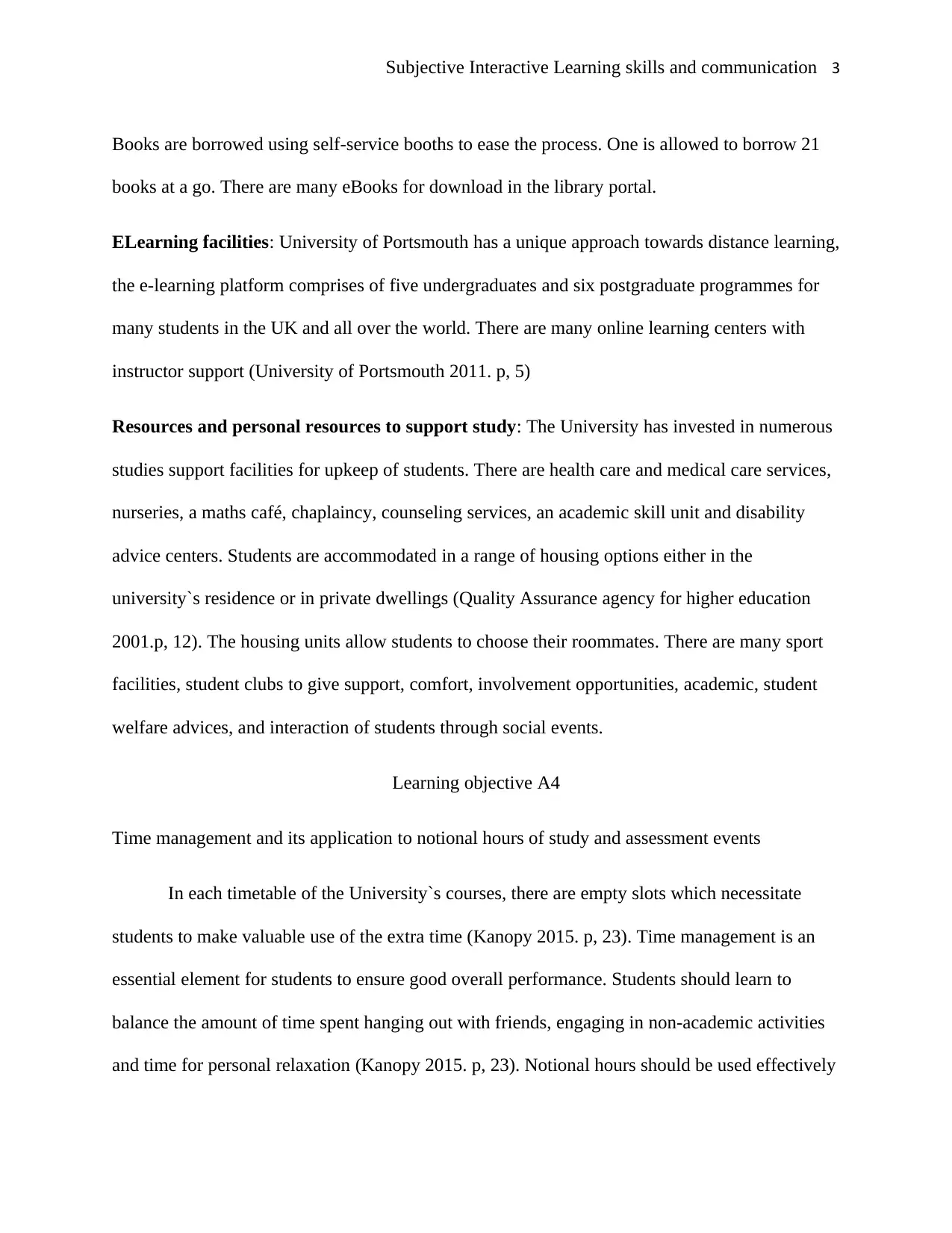
Subjective Interactive Learning skills and communication 3
Books are borrowed using self-service booths to ease the process. One is allowed to borrow 21
books at a go. There are many eBooks for download in the library portal.
ELearning facilities: University of Portsmouth has a unique approach towards distance learning,
the e-learning platform comprises of five undergraduates and six postgraduate programmes for
many students in the UK and all over the world. There are many online learning centers with
instructor support (University of Portsmouth 2011. p, 5)
Resources and personal resources to support study: The University has invested in numerous
studies support facilities for upkeep of students. There are health care and medical care services,
nurseries, a maths café, chaplaincy, counseling services, an academic skill unit and disability
advice centers. Students are accommodated in a range of housing options either in the
university`s residence or in private dwellings (Quality Assurance agency for higher education
2001.p, 12). The housing units allow students to choose their roommates. There are many sport
facilities, student clubs to give support, comfort, involvement opportunities, academic, student
welfare advices, and interaction of students through social events.
Learning objective A4
Time management and its application to notional hours of study and assessment events
In each timetable of the University`s courses, there are empty slots which necessitate
students to make valuable use of the extra time (Kanopy 2015. p, 23). Time management is an
essential element for students to ensure good overall performance. Students should learn to
balance the amount of time spent hanging out with friends, engaging in non-academic activities
and time for personal relaxation (Kanopy 2015. p, 23). Notional hours should be used effectively
Books are borrowed using self-service booths to ease the process. One is allowed to borrow 21
books at a go. There are many eBooks for download in the library portal.
ELearning facilities: University of Portsmouth has a unique approach towards distance learning,
the e-learning platform comprises of five undergraduates and six postgraduate programmes for
many students in the UK and all over the world. There are many online learning centers with
instructor support (University of Portsmouth 2011. p, 5)
Resources and personal resources to support study: The University has invested in numerous
studies support facilities for upkeep of students. There are health care and medical care services,
nurseries, a maths café, chaplaincy, counseling services, an academic skill unit and disability
advice centers. Students are accommodated in a range of housing options either in the
university`s residence or in private dwellings (Quality Assurance agency for higher education
2001.p, 12). The housing units allow students to choose their roommates. There are many sport
facilities, student clubs to give support, comfort, involvement opportunities, academic, student
welfare advices, and interaction of students through social events.
Learning objective A4
Time management and its application to notional hours of study and assessment events
In each timetable of the University`s courses, there are empty slots which necessitate
students to make valuable use of the extra time (Kanopy 2015. p, 23). Time management is an
essential element for students to ensure good overall performance. Students should learn to
balance the amount of time spent hanging out with friends, engaging in non-academic activities
and time for personal relaxation (Kanopy 2015. p, 23). Notional hours should be used effectively
⊘ This is a preview!⊘
Do you want full access?
Subscribe today to unlock all pages.

Trusted by 1+ million students worldwide
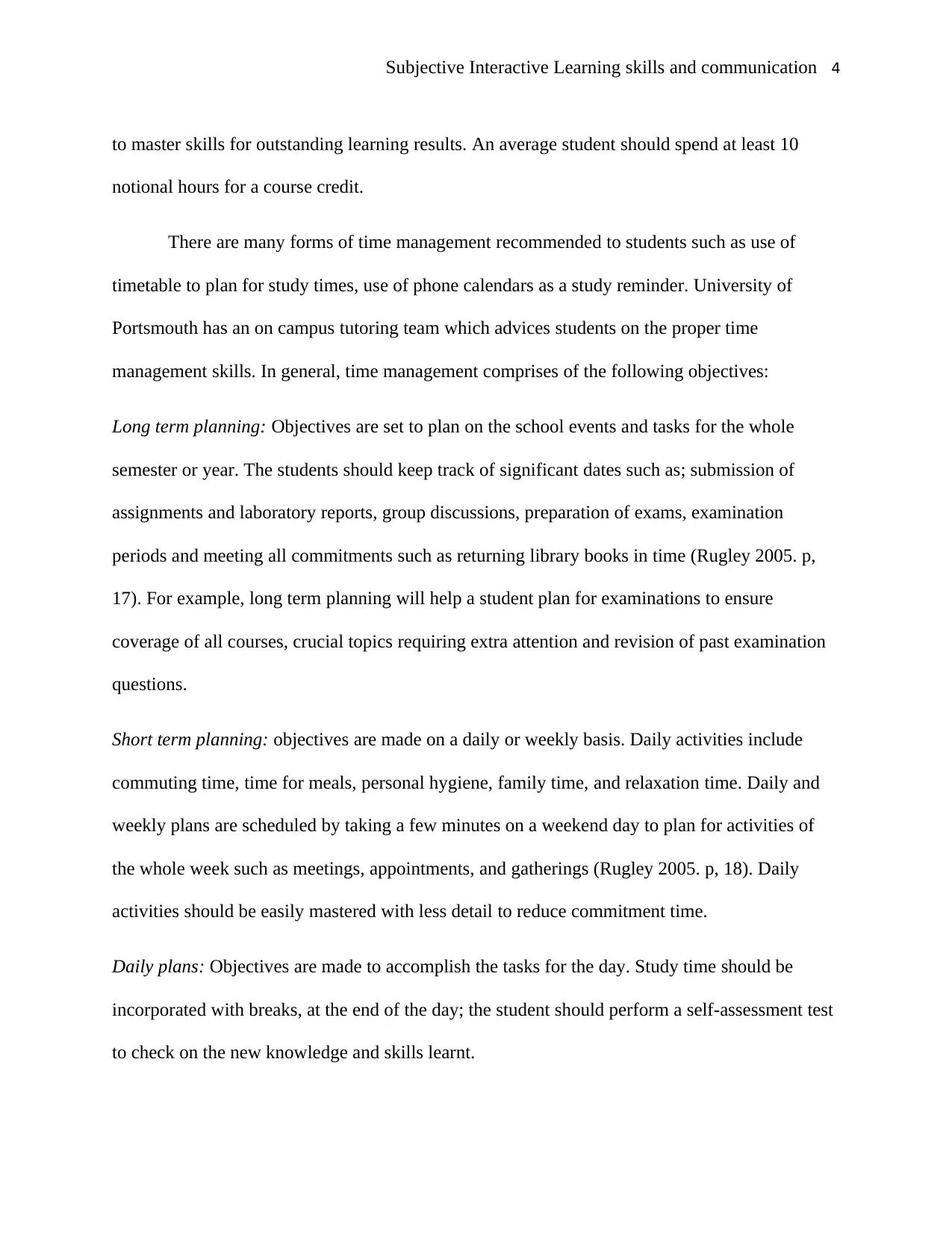
Subjective Interactive Learning skills and communication 4
to master skills for outstanding learning results. An average student should spend at least 10
notional hours for a course credit.
There are many forms of time management recommended to students such as use of
timetable to plan for study times, use of phone calendars as a study reminder. University of
Portsmouth has an on campus tutoring team which advices students on the proper time
management skills. In general, time management comprises of the following objectives:
Long term planning: Objectives are set to plan on the school events and tasks for the whole
semester or year. The students should keep track of significant dates such as; submission of
assignments and laboratory reports, group discussions, preparation of exams, examination
periods and meeting all commitments such as returning library books in time (Rugley 2005. p,
17). For example, long term planning will help a student plan for examinations to ensure
coverage of all courses, crucial topics requiring extra attention and revision of past examination
questions.
Short term planning: objectives are made on a daily or weekly basis. Daily activities include
commuting time, time for meals, personal hygiene, family time, and relaxation time. Daily and
weekly plans are scheduled by taking a few minutes on a weekend day to plan for activities of
the whole week such as meetings, appointments, and gatherings (Rugley 2005. p, 18). Daily
activities should be easily mastered with less detail to reduce commitment time.
Daily plans: Objectives are made to accomplish the tasks for the day. Study time should be
incorporated with breaks, at the end of the day; the student should perform a self-assessment test
to check on the new knowledge and skills learnt.
to master skills for outstanding learning results. An average student should spend at least 10
notional hours for a course credit.
There are many forms of time management recommended to students such as use of
timetable to plan for study times, use of phone calendars as a study reminder. University of
Portsmouth has an on campus tutoring team which advices students on the proper time
management skills. In general, time management comprises of the following objectives:
Long term planning: Objectives are set to plan on the school events and tasks for the whole
semester or year. The students should keep track of significant dates such as; submission of
assignments and laboratory reports, group discussions, preparation of exams, examination
periods and meeting all commitments such as returning library books in time (Rugley 2005. p,
17). For example, long term planning will help a student plan for examinations to ensure
coverage of all courses, crucial topics requiring extra attention and revision of past examination
questions.
Short term planning: objectives are made on a daily or weekly basis. Daily activities include
commuting time, time for meals, personal hygiene, family time, and relaxation time. Daily and
weekly plans are scheduled by taking a few minutes on a weekend day to plan for activities of
the whole week such as meetings, appointments, and gatherings (Rugley 2005. p, 18). Daily
activities should be easily mastered with less detail to reduce commitment time.
Daily plans: Objectives are made to accomplish the tasks for the day. Study time should be
incorporated with breaks, at the end of the day; the student should perform a self-assessment test
to check on the new knowledge and skills learnt.
Paraphrase This Document
Need a fresh take? Get an instant paraphrase of this document with our AI Paraphraser
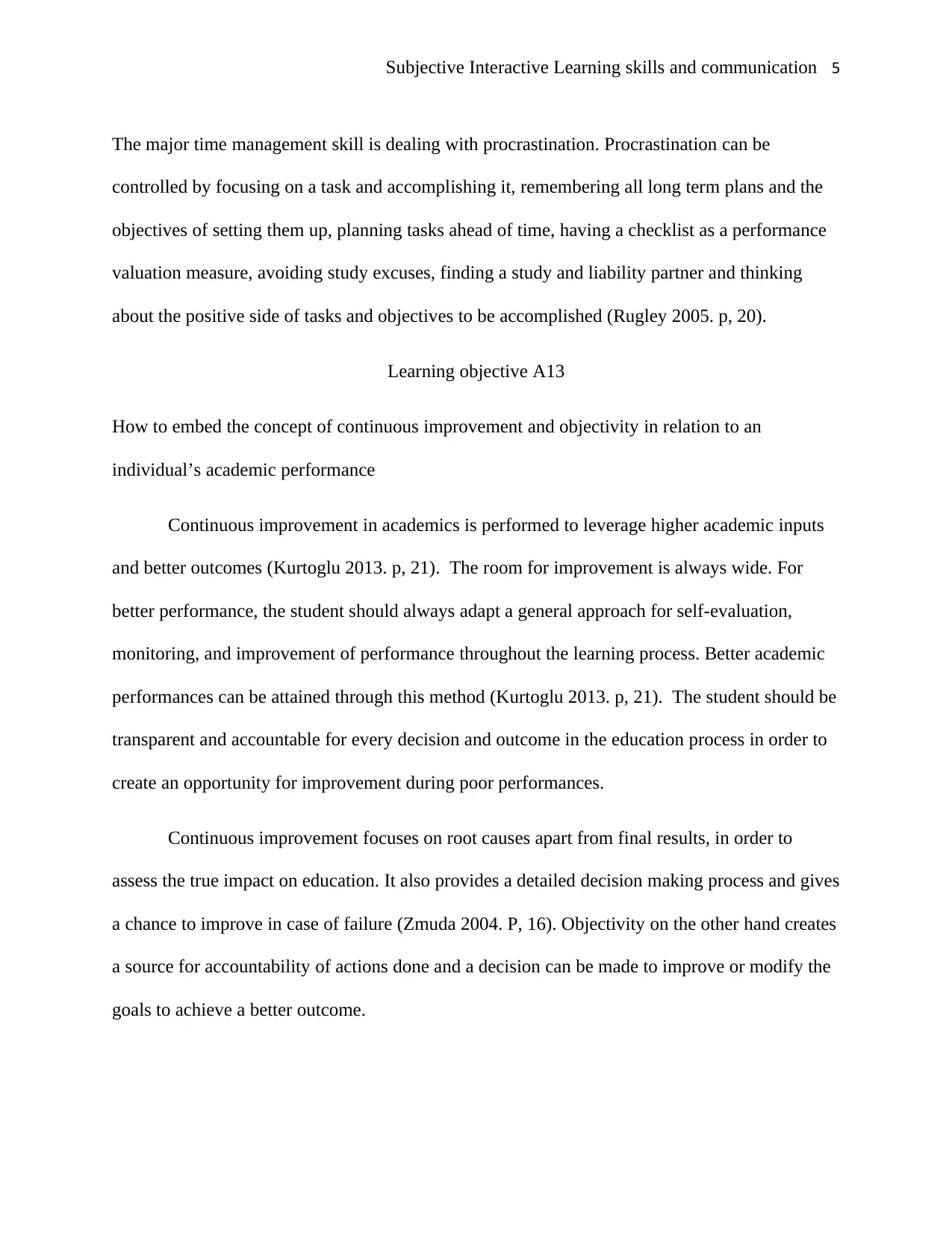
Subjective Interactive Learning skills and communication 5
The major time management skill is dealing with procrastination. Procrastination can be
controlled by focusing on a task and accomplishing it, remembering all long term plans and the
objectives of setting them up, planning tasks ahead of time, having a checklist as a performance
valuation measure, avoiding study excuses, finding a study and liability partner and thinking
about the positive side of tasks and objectives to be accomplished (Rugley 2005. p, 20).
Learning objective A13
How to embed the concept of continuous improvement and objectivity in relation to an
individual’s academic performance
Continuous improvement in academics is performed to leverage higher academic inputs
and better outcomes (Kurtoglu 2013. p, 21). The room for improvement is always wide. For
better performance, the student should always adapt a general approach for self-evaluation,
monitoring, and improvement of performance throughout the learning process. Better academic
performances can be attained through this method (Kurtoglu 2013. p, 21). The student should be
transparent and accountable for every decision and outcome in the education process in order to
create an opportunity for improvement during poor performances.
Continuous improvement focuses on root causes apart from final results, in order to
assess the true impact on education. It also provides a detailed decision making process and gives
a chance to improve in case of failure (Zmuda 2004. P, 16). Objectivity on the other hand creates
a source for accountability of actions done and a decision can be made to improve or modify the
goals to achieve a better outcome.
The major time management skill is dealing with procrastination. Procrastination can be
controlled by focusing on a task and accomplishing it, remembering all long term plans and the
objectives of setting them up, planning tasks ahead of time, having a checklist as a performance
valuation measure, avoiding study excuses, finding a study and liability partner and thinking
about the positive side of tasks and objectives to be accomplished (Rugley 2005. p, 20).
Learning objective A13
How to embed the concept of continuous improvement and objectivity in relation to an
individual’s academic performance
Continuous improvement in academics is performed to leverage higher academic inputs
and better outcomes (Kurtoglu 2013. p, 21). The room for improvement is always wide. For
better performance, the student should always adapt a general approach for self-evaluation,
monitoring, and improvement of performance throughout the learning process. Better academic
performances can be attained through this method (Kurtoglu 2013. p, 21). The student should be
transparent and accountable for every decision and outcome in the education process in order to
create an opportunity for improvement during poor performances.
Continuous improvement focuses on root causes apart from final results, in order to
assess the true impact on education. It also provides a detailed decision making process and gives
a chance to improve in case of failure (Zmuda 2004. P, 16). Objectivity on the other hand creates
a source for accountability of actions done and a decision can be made to improve or modify the
goals to achieve a better outcome.
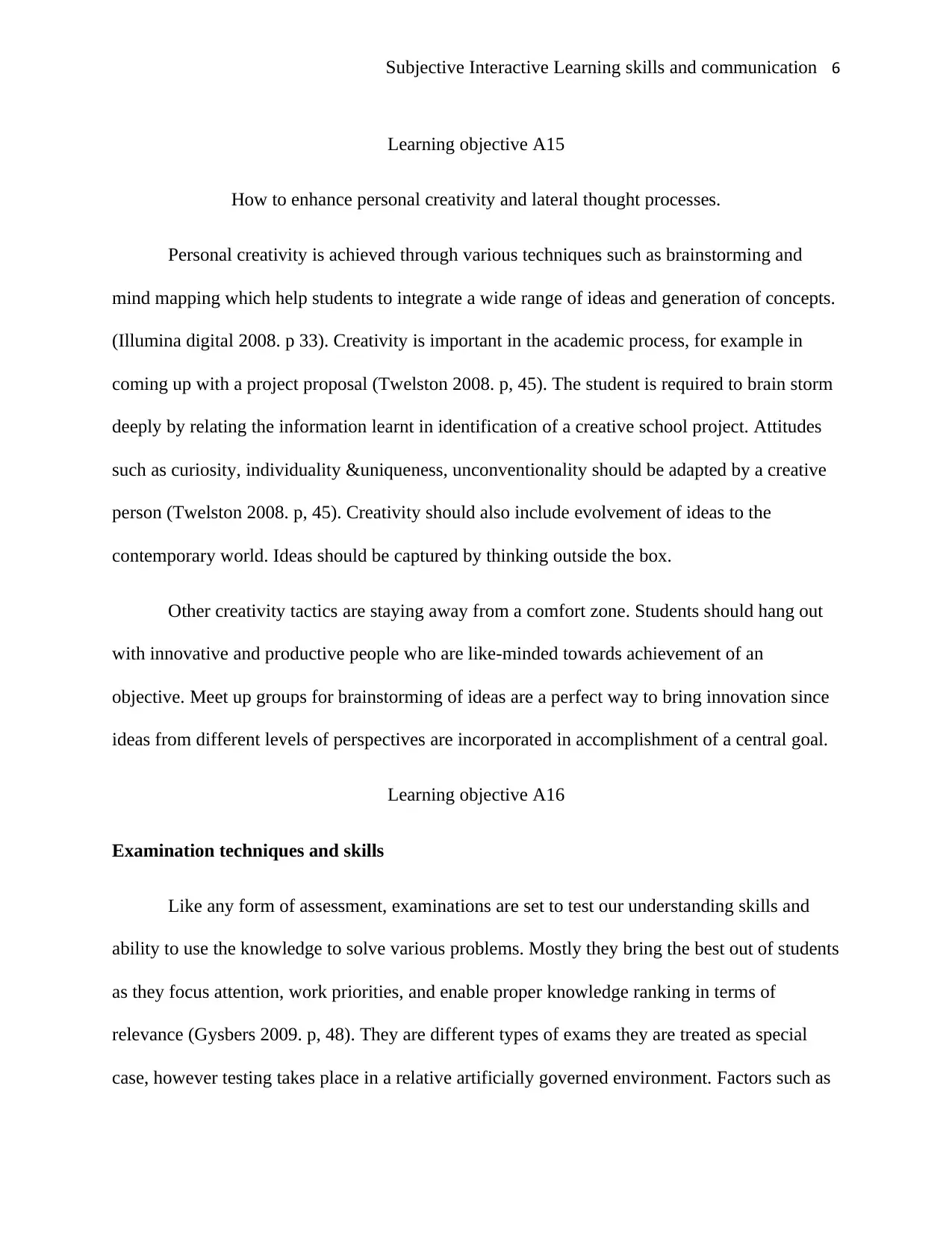
Subjective Interactive Learning skills and communication 6
Learning objective A15
How to enhance personal creativity and lateral thought processes.
Personal creativity is achieved through various techniques such as brainstorming and
mind mapping which help students to integrate a wide range of ideas and generation of concepts.
(Illumina digital 2008. p 33). Creativity is important in the academic process, for example in
coming up with a project proposal (Twelston 2008. p, 45). The student is required to brain storm
deeply by relating the information learnt in identification of a creative school project. Attitudes
such as curiosity, individuality &uniqueness, unconventionality should be adapted by a creative
person (Twelston 2008. p, 45). Creativity should also include evolvement of ideas to the
contemporary world. Ideas should be captured by thinking outside the box.
Other creativity tactics are staying away from a comfort zone. Students should hang out
with innovative and productive people who are like-minded towards achievement of an
objective. Meet up groups for brainstorming of ideas are a perfect way to bring innovation since
ideas from different levels of perspectives are incorporated in accomplishment of a central goal.
Learning objective A16
Examination techniques and skills
Like any form of assessment, examinations are set to test our understanding skills and
ability to use the knowledge to solve various problems. Mostly they bring the best out of students
as they focus attention, work priorities, and enable proper knowledge ranking in terms of
relevance (Gysbers 2009. p, 48). They are different types of exams they are treated as special
case, however testing takes place in a relative artificially governed environment. Factors such as
Learning objective A15
How to enhance personal creativity and lateral thought processes.
Personal creativity is achieved through various techniques such as brainstorming and
mind mapping which help students to integrate a wide range of ideas and generation of concepts.
(Illumina digital 2008. p 33). Creativity is important in the academic process, for example in
coming up with a project proposal (Twelston 2008. p, 45). The student is required to brain storm
deeply by relating the information learnt in identification of a creative school project. Attitudes
such as curiosity, individuality &uniqueness, unconventionality should be adapted by a creative
person (Twelston 2008. p, 45). Creativity should also include evolvement of ideas to the
contemporary world. Ideas should be captured by thinking outside the box.
Other creativity tactics are staying away from a comfort zone. Students should hang out
with innovative and productive people who are like-minded towards achievement of an
objective. Meet up groups for brainstorming of ideas are a perfect way to bring innovation since
ideas from different levels of perspectives are incorporated in accomplishment of a central goal.
Learning objective A16
Examination techniques and skills
Like any form of assessment, examinations are set to test our understanding skills and
ability to use the knowledge to solve various problems. Mostly they bring the best out of students
as they focus attention, work priorities, and enable proper knowledge ranking in terms of
relevance (Gysbers 2009. p, 48). They are different types of exams they are treated as special
case, however testing takes place in a relative artificially governed environment. Factors such as
⊘ This is a preview!⊘
Do you want full access?
Subscribe today to unlock all pages.

Trusted by 1+ million students worldwide
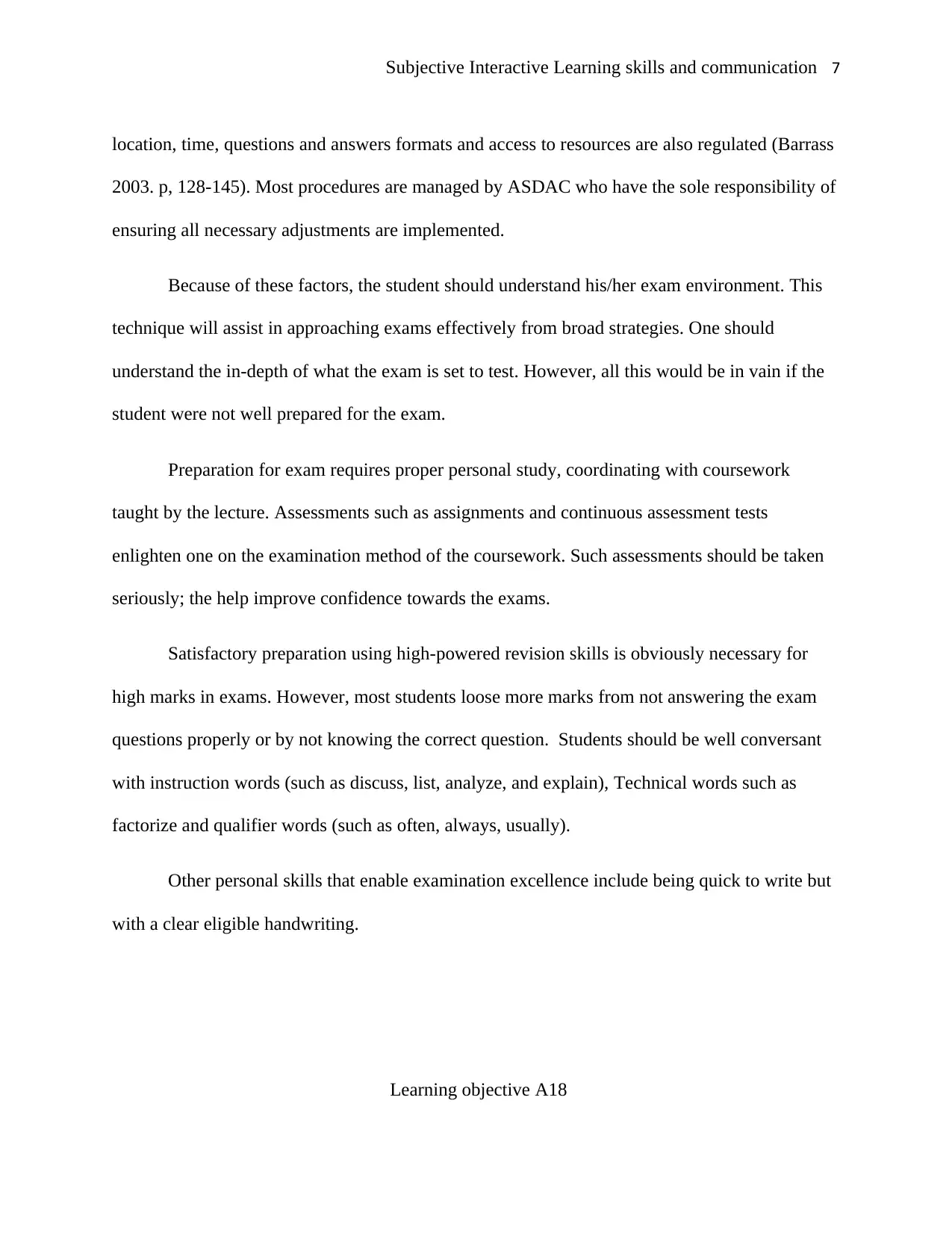
Subjective Interactive Learning skills and communication 7
location, time, questions and answers formats and access to resources are also regulated (Barrass
2003. p, 128-145). Most procedures are managed by ASDAC who have the sole responsibility of
ensuring all necessary adjustments are implemented.
Because of these factors, the student should understand his/her exam environment. This
technique will assist in approaching exams effectively from broad strategies. One should
understand the in-depth of what the exam is set to test. However, all this would be in vain if the
student were not well prepared for the exam.
Preparation for exam requires proper personal study, coordinating with coursework
taught by the lecture. Assessments such as assignments and continuous assessment tests
enlighten one on the examination method of the coursework. Such assessments should be taken
seriously; the help improve confidence towards the exams.
Satisfactory preparation using high-powered revision skills is obviously necessary for
high marks in exams. However, most students loose more marks from not answering the exam
questions properly or by not knowing the correct question. Students should be well conversant
with instruction words (such as discuss, list, analyze, and explain), Technical words such as
factorize and qualifier words (such as often, always, usually).
Other personal skills that enable examination excellence include being quick to write but
with a clear eligible handwriting.
Learning objective A18
location, time, questions and answers formats and access to resources are also regulated (Barrass
2003. p, 128-145). Most procedures are managed by ASDAC who have the sole responsibility of
ensuring all necessary adjustments are implemented.
Because of these factors, the student should understand his/her exam environment. This
technique will assist in approaching exams effectively from broad strategies. One should
understand the in-depth of what the exam is set to test. However, all this would be in vain if the
student were not well prepared for the exam.
Preparation for exam requires proper personal study, coordinating with coursework
taught by the lecture. Assessments such as assignments and continuous assessment tests
enlighten one on the examination method of the coursework. Such assessments should be taken
seriously; the help improve confidence towards the exams.
Satisfactory preparation using high-powered revision skills is obviously necessary for
high marks in exams. However, most students loose more marks from not answering the exam
questions properly or by not knowing the correct question. Students should be well conversant
with instruction words (such as discuss, list, analyze, and explain), Technical words such as
factorize and qualifier words (such as often, always, usually).
Other personal skills that enable examination excellence include being quick to write but
with a clear eligible handwriting.
Learning objective A18
Paraphrase This Document
Need a fresh take? Get an instant paraphrase of this document with our AI Paraphraser
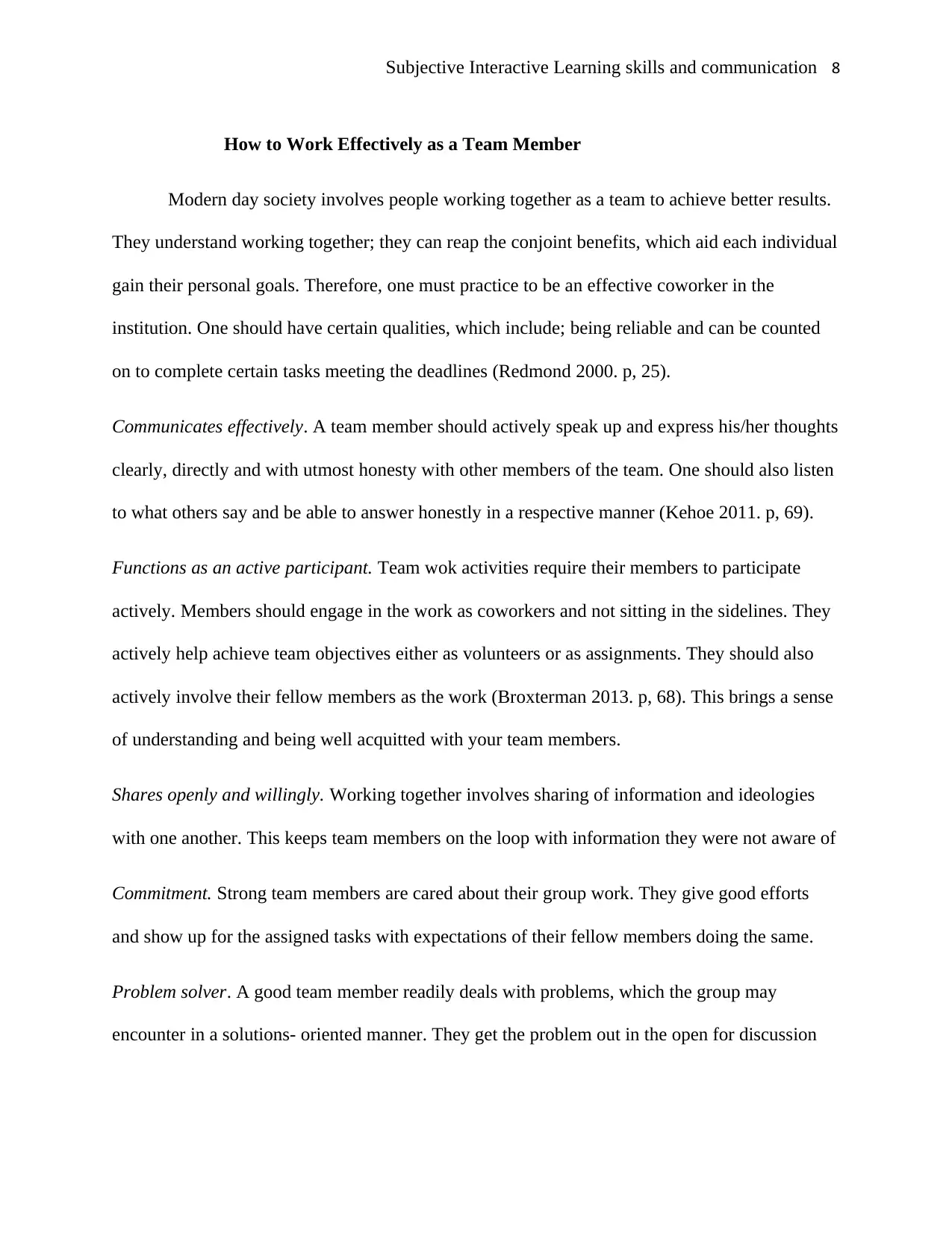
Subjective Interactive Learning skills and communication 8
How to Work Effectively as a Team Member
Modern day society involves people working together as a team to achieve better results.
They understand working together; they can reap the conjoint benefits, which aid each individual
gain their personal goals. Therefore, one must practice to be an effective coworker in the
institution. One should have certain qualities, which include; being reliable and can be counted
on to complete certain tasks meeting the deadlines (Redmond 2000. p, 25).
Communicates effectively. A team member should actively speak up and express his/her thoughts
clearly, directly and with utmost honesty with other members of the team. One should also listen
to what others say and be able to answer honestly in a respective manner (Kehoe 2011. p, 69).
Functions as an active participant. Team wok activities require their members to participate
actively. Members should engage in the work as coworkers and not sitting in the sidelines. They
actively help achieve team objectives either as volunteers or as assignments. They should also
actively involve their fellow members as the work (Broxterman 2013. p, 68). This brings a sense
of understanding and being well acquitted with your team members.
Shares openly and willingly. Working together involves sharing of information and ideologies
with one another. This keeps team members on the loop with information they were not aware of
Commitment. Strong team members are cared about their group work. They give good efforts
and show up for the assigned tasks with expectations of their fellow members doing the same.
Problem solver. A good team member readily deals with problems, which the group may
encounter in a solutions- oriented manner. They get the problem out in the open for discussion
How to Work Effectively as a Team Member
Modern day society involves people working together as a team to achieve better results.
They understand working together; they can reap the conjoint benefits, which aid each individual
gain their personal goals. Therefore, one must practice to be an effective coworker in the
institution. One should have certain qualities, which include; being reliable and can be counted
on to complete certain tasks meeting the deadlines (Redmond 2000. p, 25).
Communicates effectively. A team member should actively speak up and express his/her thoughts
clearly, directly and with utmost honesty with other members of the team. One should also listen
to what others say and be able to answer honestly in a respective manner (Kehoe 2011. p, 69).
Functions as an active participant. Team wok activities require their members to participate
actively. Members should engage in the work as coworkers and not sitting in the sidelines. They
actively help achieve team objectives either as volunteers or as assignments. They should also
actively involve their fellow members as the work (Broxterman 2013. p, 68). This brings a sense
of understanding and being well acquitted with your team members.
Shares openly and willingly. Working together involves sharing of information and ideologies
with one another. This keeps team members on the loop with information they were not aware of
Commitment. Strong team members are cared about their group work. They give good efforts
and show up for the assigned tasks with expectations of their fellow members doing the same.
Problem solver. A good team member readily deals with problems, which the group may
encounter in a solutions- oriented manner. They get the problem out in the open for discussion
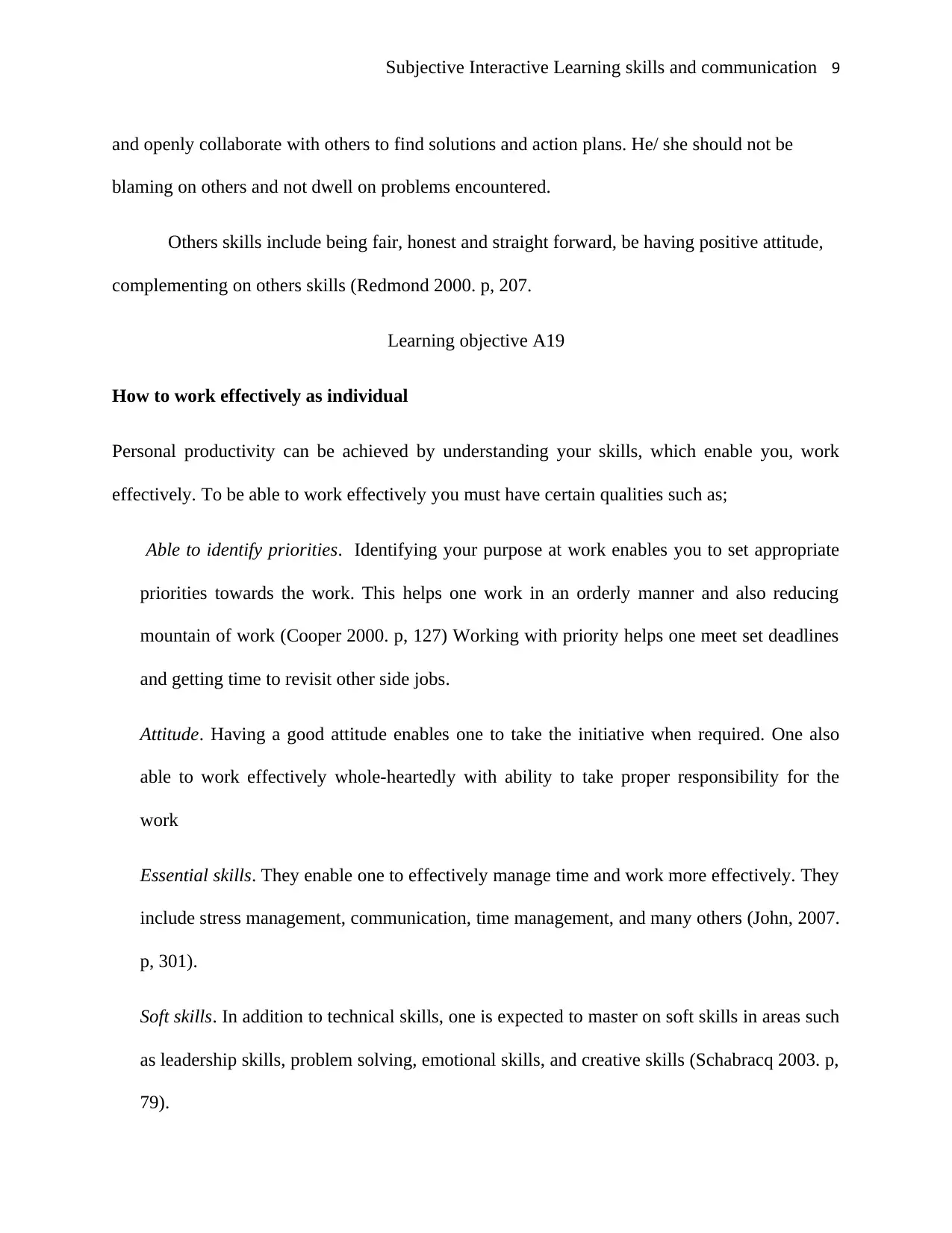
Subjective Interactive Learning skills and communication 9
and openly collaborate with others to find solutions and action plans. He/ she should not be
blaming on others and not dwell on problems encountered.
Others skills include being fair, honest and straight forward, be having positive attitude,
complementing on others skills (Redmond 2000. p, 207.
Learning objective A19
How to work effectively as individual
Personal productivity can be achieved by understanding your skills, which enable you, work
effectively. To be able to work effectively you must have certain qualities such as;
Able to identify priorities. Identifying your purpose at work enables you to set appropriate
priorities towards the work. This helps one work in an orderly manner and also reducing
mountain of work (Cooper 2000. p, 127) Working with priority helps one meet set deadlines
and getting time to revisit other side jobs.
Attitude. Having a good attitude enables one to take the initiative when required. One also
able to work effectively whole-heartedly with ability to take proper responsibility for the
work
Essential skills. They enable one to effectively manage time and work more effectively. They
include stress management, communication, time management, and many others (John, 2007.
p, 301).
Soft skills. In addition to technical skills, one is expected to master on soft skills in areas such
as leadership skills, problem solving, emotional skills, and creative skills (Schabracq 2003. p,
79).
and openly collaborate with others to find solutions and action plans. He/ she should not be
blaming on others and not dwell on problems encountered.
Others skills include being fair, honest and straight forward, be having positive attitude,
complementing on others skills (Redmond 2000. p, 207.
Learning objective A19
How to work effectively as individual
Personal productivity can be achieved by understanding your skills, which enable you, work
effectively. To be able to work effectively you must have certain qualities such as;
Able to identify priorities. Identifying your purpose at work enables you to set appropriate
priorities towards the work. This helps one work in an orderly manner and also reducing
mountain of work (Cooper 2000. p, 127) Working with priority helps one meet set deadlines
and getting time to revisit other side jobs.
Attitude. Having a good attitude enables one to take the initiative when required. One also
able to work effectively whole-heartedly with ability to take proper responsibility for the
work
Essential skills. They enable one to effectively manage time and work more effectively. They
include stress management, communication, time management, and many others (John, 2007.
p, 301).
Soft skills. In addition to technical skills, one is expected to master on soft skills in areas such
as leadership skills, problem solving, emotional skills, and creative skills (Schabracq 2003. p,
79).
⊘ This is a preview!⊘
Do you want full access?
Subscribe today to unlock all pages.

Trusted by 1+ million students worldwide
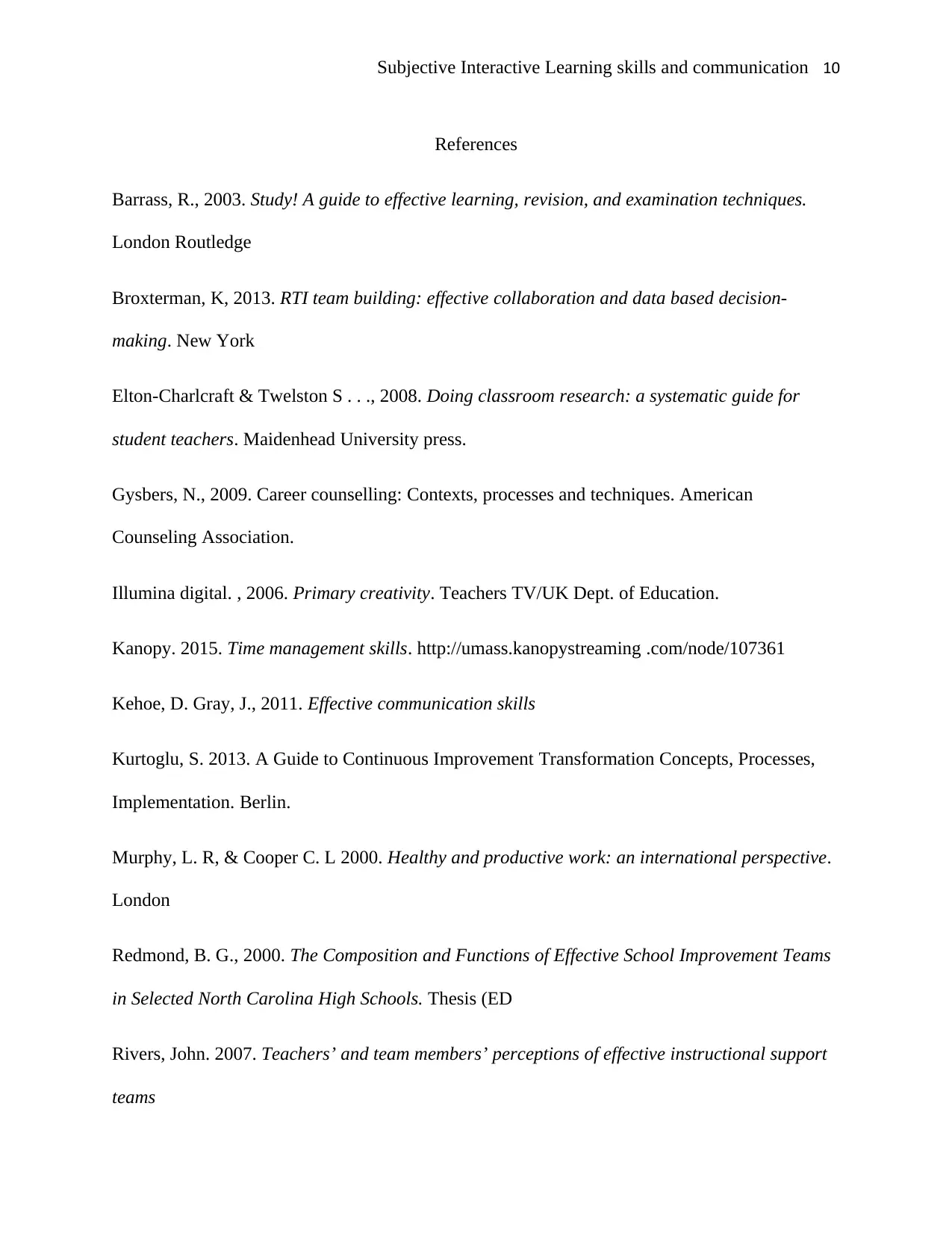
Subjective Interactive Learning skills and communication 10
References
Barrass, R., 2003. Study! A guide to effective learning, revision, and examination techniques.
London Routledge
Broxterman, K, 2013. RTI team building: effective collaboration and data based decision-
making. New York
Elton-Charlcraft & Twelston S . . ., 2008. Doing classroom research: a systematic guide for
student teachers. Maidenhead University press.
Gysbers, N., 2009. Career counselling: Contexts, processes and techniques. American
Counseling Association.
Illumina digital. , 2006. Primary creativity. Teachers TV/UK Dept. of Education.
Kanopy. 2015. Time management skills. http://umass.kanopystreaming .com/node/107361
Kehoe, D. Gray, J., 2011. Effective communication skills
Kurtoglu, S. 2013. A Guide to Continuous Improvement Transformation Concepts, Processes,
Implementation. Berlin.
Murphy, L. R, & Cooper C. L 2000. Healthy and productive work: an international perspective.
London
Redmond, B. G., 2000. The Composition and Functions of Effective School Improvement Teams
in Selected North Carolina High Schools. Thesis (ED
Rivers, John. 2007. Teachers’ and team members’ perceptions of effective instructional support
teams
References
Barrass, R., 2003. Study! A guide to effective learning, revision, and examination techniques.
London Routledge
Broxterman, K, 2013. RTI team building: effective collaboration and data based decision-
making. New York
Elton-Charlcraft & Twelston S . . ., 2008. Doing classroom research: a systematic guide for
student teachers. Maidenhead University press.
Gysbers, N., 2009. Career counselling: Contexts, processes and techniques. American
Counseling Association.
Illumina digital. , 2006. Primary creativity. Teachers TV/UK Dept. of Education.
Kanopy. 2015. Time management skills. http://umass.kanopystreaming .com/node/107361
Kehoe, D. Gray, J., 2011. Effective communication skills
Kurtoglu, S. 2013. A Guide to Continuous Improvement Transformation Concepts, Processes,
Implementation. Berlin.
Murphy, L. R, & Cooper C. L 2000. Healthy and productive work: an international perspective.
London
Redmond, B. G., 2000. The Composition and Functions of Effective School Improvement Teams
in Selected North Carolina High Schools. Thesis (ED
Rivers, John. 2007. Teachers’ and team members’ perceptions of effective instructional support
teams
Paraphrase This Document
Need a fresh take? Get an instant paraphrase of this document with our AI Paraphraser
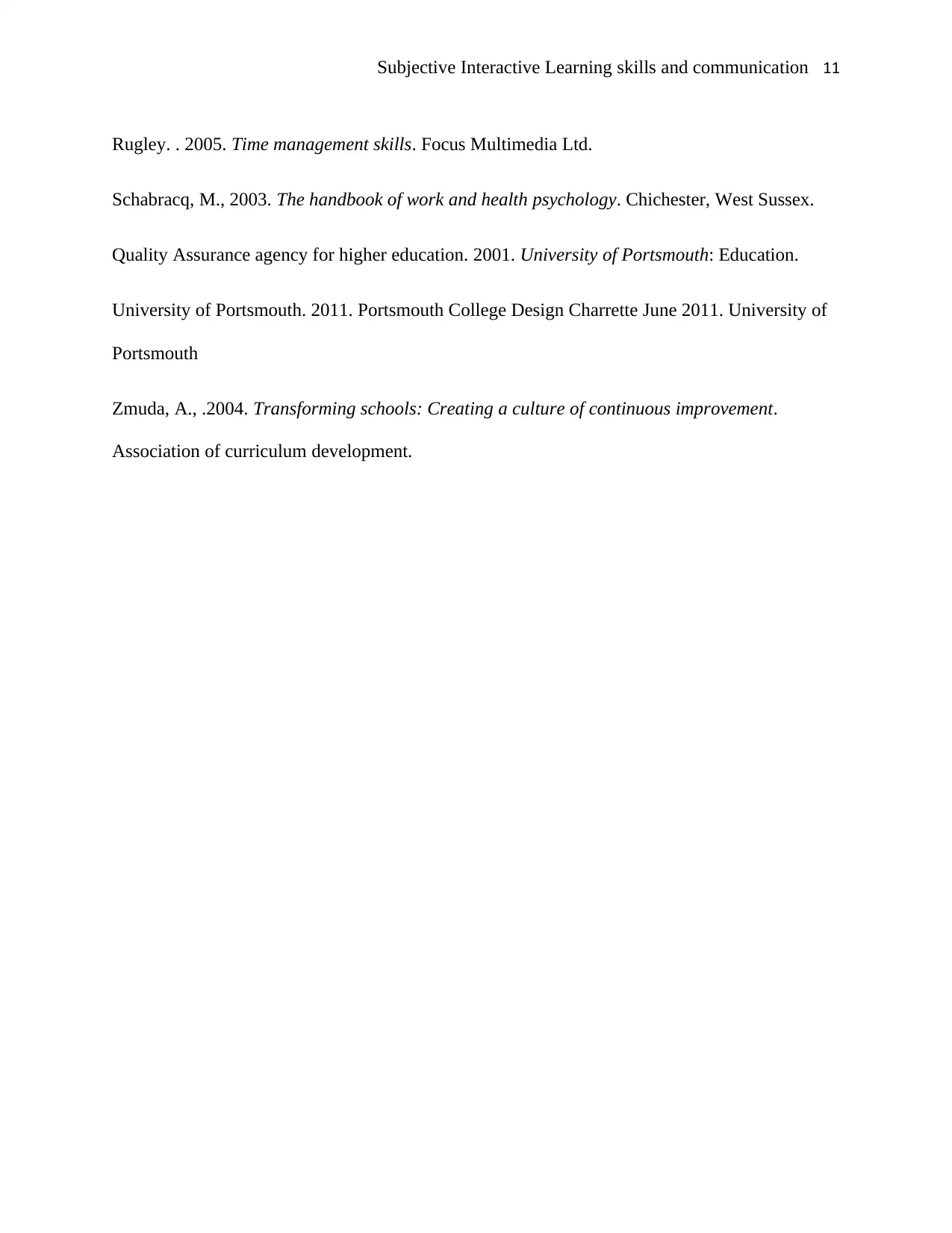
Subjective Interactive Learning skills and communication 11
Rugley. . 2005. Time management skills. Focus Multimedia Ltd.
Schabracq, M., 2003. The handbook of work and health psychology. Chichester, West Sussex.
Quality Assurance agency for higher education. 2001. University of Portsmouth: Education.
University of Portsmouth. 2011. Portsmouth College Design Charrette June 2011. University of
Portsmouth
Zmuda, A., .2004. Transforming schools: Creating a culture of continuous improvement.
Association of curriculum development.
Rugley. . 2005. Time management skills. Focus Multimedia Ltd.
Schabracq, M., 2003. The handbook of work and health psychology. Chichester, West Sussex.
Quality Assurance agency for higher education. 2001. University of Portsmouth: Education.
University of Portsmouth. 2011. Portsmouth College Design Charrette June 2011. University of
Portsmouth
Zmuda, A., .2004. Transforming schools: Creating a culture of continuous improvement.
Association of curriculum development.
1 out of 11
Related Documents
Your All-in-One AI-Powered Toolkit for Academic Success.
+13062052269
info@desklib.com
Available 24*7 on WhatsApp / Email
![[object Object]](/_next/static/media/star-bottom.7253800d.svg)
Unlock your academic potential
Copyright © 2020–2026 A2Z Services. All Rights Reserved. Developed and managed by ZUCOL.




